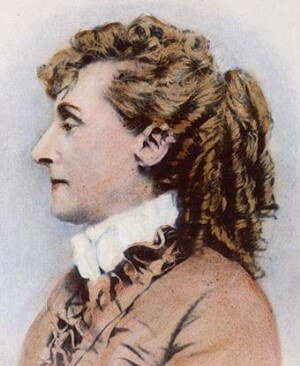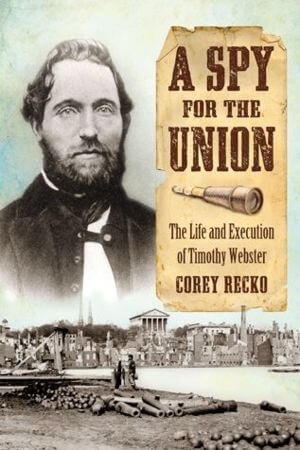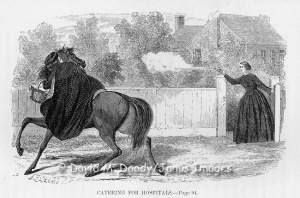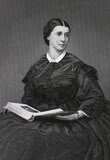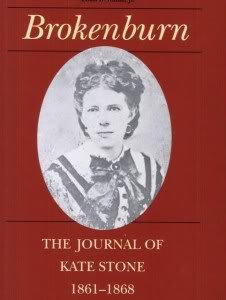Union Spy and First Female Private Investigator

Not much is known about Kate Warne prior to the day she walked into the Pinkerton National Detective Agency in 1856.
Answering an ad in a local newspaper, Warne went to Pinkerton’s Chicago office and asked to see Allan Pinkerton about a job. There is still debate whether or not she intended to become a detective or a secretary. There were no women detectives until well after the Civil War. Pinkerton himself claimed that she demanded to become a detective.
According to Pinkerton’s records, he was surprised to learn Kate was not looking for clerical work, but was actually answering an advertisement for detectives he had placed in a Chicago newspaper. Pinkerton said, ‘It is not the custom to employ women detectives.’ Kate argued eloquently that women could be ‘most useful in worming out secrets in many places which would be impossible for a male detective.’ A woman would be able to befriend the wives and girlfriends of suspected criminals and gain their confidence.
Her argument impressed Pinkerton and on August 23, 1856, he employed Kate Warne, over the strong objections of his brother Robert who was also his partner in the business. According to Pinkerton family history, Allan was smitten with the woman; she became his mistress and traveled with him. (He had a wife and children at home.) This caused problems when his brother questioned some of the expenses she turned in to the agency.
Thus, Warne became the first female private detective in the United States. Moreover, Pinkerton soon hired other females. Their ranks grew, Kate having shown Pinkerton their intrinsic value to his organization, and he appointed Warne Supervisor of Female Detectives.
Warne became a very good private investigator and acted undercover, infiltrating social eventss and gathering information no man could have obtained. She wore disguises, changed her accent at will and became a huge asset to the Agency. Pinkerton insisted on high decorum from his agents. According to his code, they were to have no “addiction to drink, smoking, card playing or low dives.”
As the agency’s reputation spread, their cases often involved the tracking of a criminal through many states and over many months before the matter was resolved.
In 1858 Warne was involved in the Adams Express Company embezzlement case. The prime suspect, Mr. Maroney, was an expressman in Montgomery, Alabama, who had stolen $50,000 from the company. Warne gained the confidence of Maroney’s wife and acquired the evidence that led to the husband’s conviction. With Warne’s help, $39,515 was returned and Maroney was sentenced to ten years in prison.
The Baltimore Plot
In early 1861 Pinkerton’s was hired by Samuel Felton, president of the Philadelphia, Wilmington and Baltimore Railroad, to investigate secessionist activity in Maryland. Felton was concerned about threats of damage to the railroad by “roughs and secessionists of Maryland.” Pinkerton placed agents at various points in Maryland to investigate. As the information came in, he became increasingly aware that the activity in Maryland also included an assassination plot.
Kate Warne was part of the Pinkerton team sent to Baltimore on February 3, 1861, that uncovered a plot to assassinate Abraham Lincoln while he was changing trains in Baltimore on his way to Washington, DC, to take the oath of office. The sentiment there was that if Lincoln came through the city he would leave in a casket.
Using the aliases Mrs. Cherry and Mrs. M. Barley (M.B.), Warne infiltrated secessionist social gatherings posing as a flirting Southern belle with a thick Southern accent in places such as the classy Barnum Hotel. She discovered not only that there was a plan to assassinate Lincoln but also the exact time and place where it was to be carried out.
The plan she discovered was to occur as Lincoln was passing through the narrow vestibule of the Calvert St. Station in Baltimore. A fight was to be staged there in hopes that the few policemen at the Depot would rush to see what the ruckus was about, thus leaving Mr. Lincoln at the mercy of a mob of Secessionists who were to surround him at that time.
After hearing this, Allan Pinkerton requested a meeting with Lincoln while he was still in Philadelphia, which was granted. Lincoln listened and interrupted with many questions, then placed himself in the protective custody of Pinkerton’s agency to get him safely to Washington, DC, for his inauguration.
Kate Warne was a key player in the foiled Baltimore assassination plot. Not only did she help to uncover details of the planned plot, but she also carried out most of the arrangements to smuggle Lincoln into Washington. Warne advised that, rather than ride publicly through the city streets between train stations in Baltimore as planned, he take a midnight train straight through to the capital, not stopping in Baltimore to make a speech.
As per his schedule, on Friday, February 22, 1861, Lincoln appeared before the state legislature at Harrisburg, Pennsylvania, where he says, “It shall be my endeavor to preserve the peace of this country.” Lincoln’s train left Harrisburg at 11:00 pm and headed to Philadelphia and then on to Baltimore.
Instead of attending a ball the following night, Lincoln was hurried out of Philadelphia on a chartered train to Baltimore. The tracks were to be kept clear so they could go full-speed all the way. Warne had secured four berths on the train under the pretext that they were for her family members, including her invalid brother.
At the station, Warne entered the sleeping car through the rear along with Pinkerton, Ward Hill Lamon – a personal friend and self-appointed bodyguard to Lincoln – and a disguised president-elect. Lincoln wore a soft felt cap and was wrapped in a shawl and quickly placed on the train. The train pulled out shortly before 11 p.m.
“A Pinkerton operative stood watch at every switch, bridge and crossing,” explains the book Allan Pinkerton – America’s First Private Eye, by Sigmund A. Lavine. “They had orders to signal with their bull’s-eye – two flashes, a short pause, then two more flashes – [indicating that] all was well as Lincoln’s train passed… Those signals continued to gleam throughout the night [until] the train rolled safely into the station in Baltimore.”
The presidential party arrived at Baltimore about 3:30 a.m. on February 23 – hours ahead of his anticipated arrival – where Warne had arranged for an express train to be waiting. The sleeping cars with Lincoln on board were shifted to another engine and off they went, arriving in Washington around 6 a.m.
The Civil War
Over the coming weeks, Lincoln was sworn in as President of the United States, but the states proved not to be fully united. On April 13, 1861, the provisional Confederate States of America fired upon Fort Sumter in Charleston Harbor.
President Abraham Lincoln called Pinkerton to Washington to organize a secret service in the capital, but Lincoln’s Cabinet had another candidate for that position.Meanwhile, General George B. McClellan asked Pinkerton to set up a military intelligence service for his command, and the detective accepted.
By the end of July 1861, they had set up headquarters in Cincinnati, Ohio, to follow McClellan’s division. Pinkerton brought Kate Warne with him and placed her in and around the South to pick up information for the Northern armies. She shared her time between Virginia and Tennessee posing as a Southern belle, familiarizing herself with other ladies of the South who spoke freely about their husbands’ and boyfriends’ regiments.
Warne found that information was not hard to come by. Loitering in camp towns and ingratiating themselves with the local soldiery in the hotbed of the South, they were able to pick up such vital intelligence as to what army corps was stationed where, who the commanders were, where fortifications existed and what was the strength of their artillery.
She could easily penetrated Southern social gatherings. Pinkerton and Warne often posed as a married couple while undercover. She also had an assortment of names: Kay Warne, Kate Warren, Kay Warren, Kay Warne, Kitty Warne, Kitty Warren, Kittie Warne, and Kittie Warren. All documents from the Pinkerton archive, however, spelled her name Kate Warne.

It is believed that Pinkerton came up with the company logo for his agency – We Never Sleep – because Kate Warne never left Lincoln’s side the night she escorted him to Washington, DC, for his inauguration. Americans soon became familiar with the motto and the graphic of an alert eye studying them from the pages of magazines, circulars, newspapers, billboards and wanted posters. This trademark spawned the term private eye.
General George B. McClellan was appointed Commander in Chief of the Union Army in 1861, and he credited Pinkerton agents for supplying necessary information beforehand concerning enemy movements and their strength. Taking the military reins, he hoped that Pinkerton would continue to support him undercover, but Lincoln had other plans for Pinkerton: to root out traitors and spies from their nests in Washington, DC.
Pinkerton promised McClellan the use of his operatives, but he went to Washington and organized the first government-approved spy ring in American history, working out of an office on I Street. One agent who never failed him was Kate Warne. Gliding through Capital society with ease under the guise of a transplanted Southerner, she used her knowledge of Southern tradition and etiquette to grace the parlors of many Southern-minded families in Washington and suburban Georgetown.
Before long the lovely new belle with a whimsical giggle, flashing eyes and a wrist fan was doted on by some of the district’s most eligible gentlemen with secessionist secrets. At balls, she sometimes spotted famous faces who were suspected members of Southern-sympathy groups. One was the handsome Shakespearean play actor John Wilkes Booth. The information she acquired, the whispers she heard, she fed everything to her boss on I Street.
Lafayette Baker, a Union spy and paranoid who saw Confederate spies behind every bush, won the trust of Secretary of War Edwin Stanton by convincing him that Pinkerton’s methods were too vague and Pinkerton himself too lenient. Stanton, who shared Baker’s loathing for anything Southern to the point of obsession, had Baker’s group of operatives appointed the official espionage unit in Washington.
At the same time, a dissatisfied Lincoln replaced George McClellan as Commander in Chief of the Union Army. His potential gone and his best ally fired, Pinkerton withdrew from the capital in 1862 and spent the remaining two-and-a-half war years serving the government in a number of other ways. Among these was tracking down crooked suppliers who were taking advantage of its client by overcharging for equipment and deliveries.
To his death, Allan Pinkerton regretted that he was not in charge of Washington’s security measures on the evening of April 14, 1865, when actor John Wilkes Booth fired a bullet into Lincoln’s head. He believed that had his detectives been in charge Booth would never have reached the President’s box.
Kate Warne worked on many tough cases after the war, but her two most known were murder cases. One was a combined bank robbery and murder in Mississippi. Since Pinkerton did not have enough evidence to put his main suspect in jail, Kate became good friends with his wife and the wife ended up confessing where her husband hid the money. The other case concerned a man who thought his sister was trying to poison him. Kate disguised herself as a fortune teller and exposed the murderer.
Pinkerton named Kate Warne one of his top five detectives. Her convincing Pinkerton to employ her was a significant moment in women’s history. Women were not allowed to be a part of the police force until 1891 and could not be detectives until 1903.
In his memoirs, Pinkerton credits two specific agents for doing more in the early days than anyone else to establish the firm’s reputation for efficiency and honor: Kate Warne and Timothy Webster, who was executed during the Civil War for espionage. Warne reported back to Pinkerton about all her work when he was away from the office and they worked together on numerous cases.
Kate Warne died suddenly of pneumonia on January 28, 1868, with Pinkerton at her bedside. She was only 35 years old. As a tribute to her service, Pinkerton allowed her to be buried in his family’s private plot in Chicago’s Graceland Cemetery. Allan Pinkerton was later buried beside her.
SOURCES
Wikipedia: Kate Warne
Kate Warne First Female Private-Eye
Allan Pinkerton and His Detective Agency: We Never Sleep

